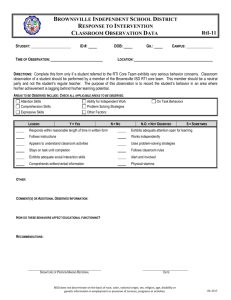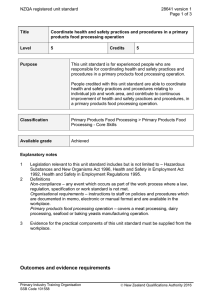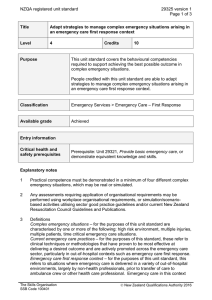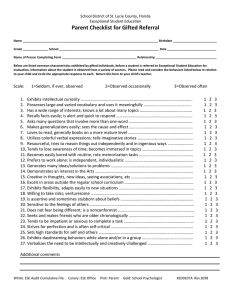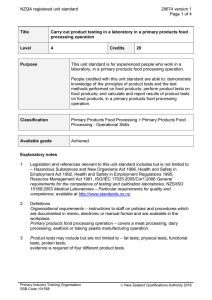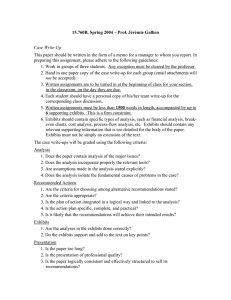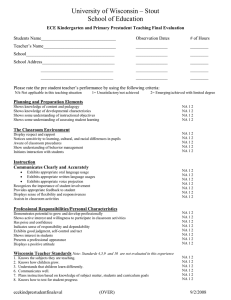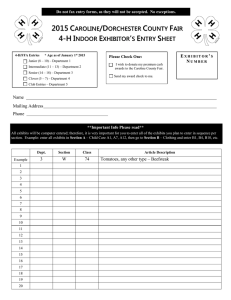NZQA registered unit standard 26920 version 1 Page 1 of 4
advertisement
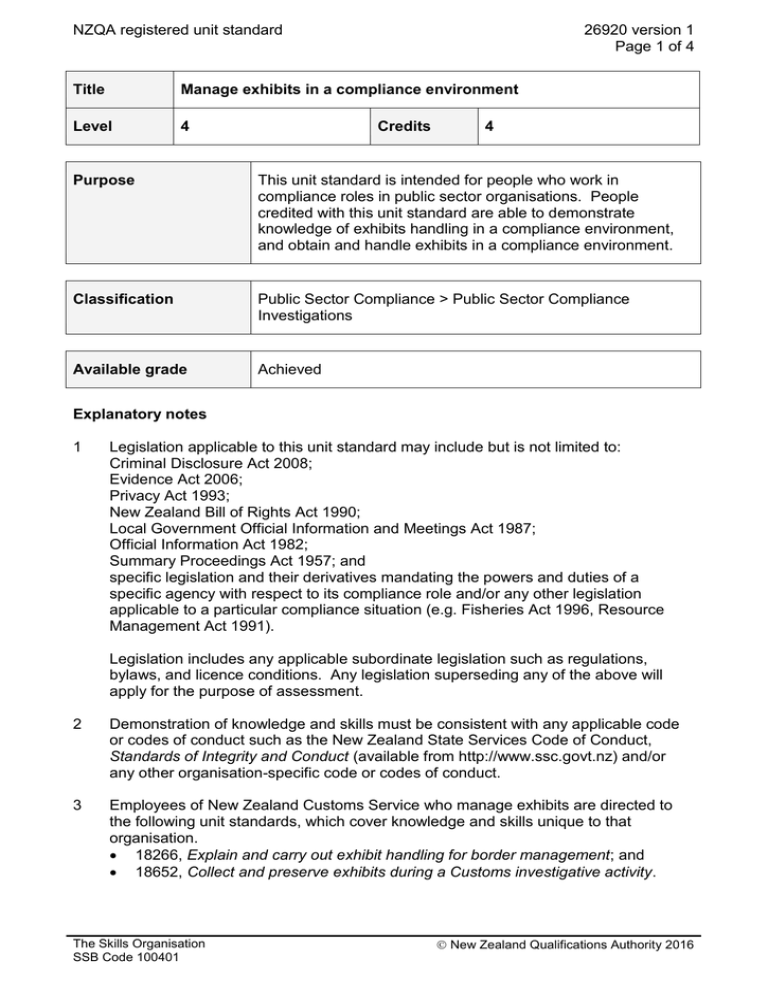
NZQA registered unit standard 26920 version 1 Page 1 of 4 Title Manage exhibits in a compliance environment Level 4 Credits 4 Purpose This unit standard is intended for people who work in compliance roles in public sector organisations. People credited with this unit standard are able to demonstrate knowledge of exhibits handling in a compliance environment, and obtain and handle exhibits in a compliance environment. Classification Public Sector Compliance > Public Sector Compliance Investigations Available grade Achieved Explanatory notes 1 Legislation applicable to this unit standard may include but is not limited to: Criminal Disclosure Act 2008; Evidence Act 2006; Privacy Act 1993; New Zealand Bill of Rights Act 1990; Local Government Official Information and Meetings Act 1987; Official Information Act 1982; Summary Proceedings Act 1957; and specific legislation and their derivatives mandating the powers and duties of a specific agency with respect to its compliance role and/or any other legislation applicable to a particular compliance situation (e.g. Fisheries Act 1996, Resource Management Act 1991). Legislation includes any applicable subordinate legislation such as regulations, bylaws, and licence conditions. Any legislation superseding any of the above will apply for the purpose of assessment. 2 Demonstration of knowledge and skills must be consistent with any applicable code or codes of conduct such as the New Zealand State Services Code of Conduct, Standards of Integrity and Conduct (available from http://www.ssc.govt.nz) and/or any other organisation-specific code or codes of conduct. 3 Employees of New Zealand Customs Service who manage exhibits are directed to the following unit standards, which cover knowledge and skills unique to that organisation. 18266, Explain and carry out exhibit handling for border management; and 18652, Collect and preserve exhibits during a Customs investigative activity. The Skills Organisation SSB Code 100401 New Zealand Qualifications Authority 2016 NZQA registered unit standard 4 26920 version 1 Page 2 of 4 Definitions Compliance (role of) refers to the role, in a public sector organisation, of assessing compliance subjects’ levels of adherence with regulatory requirements and carrying out any appropriate intervention. Compliance environment refers to the physical, social, economic, political, and geographical environment that a public sector organisation’s compliance role is carried out in. Compliance investigation refers to the process of gathering and assessing information to determine facts and, thereby, to determine degree of compliance or otherwise. Compliance subject refers to a natural person or an entity that is subject, in a particular compliance context, to being regulated. Evidence refers to information given personally, or drawn from a document or exhibit, which tends to prove or disprove a fact. Exhibit refers to material evidence secured in the course of an investigation. Ingredients refer to the details or components of an offence which are unique to the offence and which must be proven. Offence is a violation or breach of a law or rule. For the purpose of this unit standard, offences may incorporate any non-compliance with statute, Regulations, Bylaws, licence conditions, and other subordinate legislation. Organisation refers to a public sector organisation, as listed in the Public Sector Directory at http://psd.govt.nz/list/index.php. Organisational requirements refer to instructions to staff on policies, procedures, and methodologies which are documented and are available in the workplace. Security and evidential requirements are the requirements adopted by a compliance organisation to keep information and exhibits secure against unauthorised access or loss, and to ensure admissibility and reliability in a judicial proceeding. Evidential requirements are a subset of these and relate to admissibility of evidence. Outcomes and evidence requirements Outcome 1 Demonstrate knowledge of exhibits handling in a compliance environment. Evidence requirements 1.1 Exhibits handling is explained in terms of its importance in compliance investigations. 1.2 Explanation of the process for maintaining the chain of evidence is consistent with evidential and organisational requirements. 1.3 The handling of exhibits is explained in terms of preserving and maintaining integrity of evidence. Range The Skills Organisation SSB Code 100401 types or classes of exhibits relevant to an organisation. New Zealand Qualifications Authority 2016 NZQA registered unit standard 26920 version 1 Page 3 of 4 Outcome 2 Obtain exhibits in a compliance environment. Evidence requirements 2.1 Identification of exhibits is consistent with needs of the compliance investigations. Range needs of the investigation include but are not limited to – relevance in terms of the ingredients of the alleged offence or offences, possible link to potential defences. 2.2 Actions taken to obtain the exhibits ensure their preservation in their found state, prevent contamination, and control any hazards associated with the exhibits. 2.3 Exhibits are obtained in accordance with evidential and organisational requirements. 2.4 The exhibits are contained and labelled to ensure continuity and integrity, in accordance with security, evidential, and organisational requirements. 2.5 Documentation relating to exhibits is maintained to meet evidential and organisational requirements. Range includes but is not limited to – property record sheets, exhibit register, online data bases. Outcome 3 Handle exhibits in a compliance environment. Evidence requirements 3.1 Exhibits are stored to maintain continuity and prevent degradation and contamination, in accordance with security, evidential, and organisational requirements. 3.2 Any exhibits that are unsuitable for physical storage are preserved by other means in accordance with security, evidential, and organisational requirements. Range 3.3 other means may include but are not limited to – photographic, electronic. The movement of exhibits for investigative purposes is recorded in accordance with security, evidential, and organisational requirements. Range The Skills Organisation SSB Code 100401 investigative purposes may include but are not limited to – referral during an interview, identification, testing or analysis, presentation in court proceedings, disposal. New Zealand Qualifications Authority 2016 NZQA registered unit standard 26920 version 1 Page 4 of 4 3.4 Exhibits are prepared for, and presented in, judicial hearings in accordance with evidential and organisational requirements. 3.5 The return, disposal, or retention of exhibits is facilitated in accordance with legal and/or organisational requirements. Planned review date 31 December 2015 Status information and last date for assessment for superseded versions Process Version Date Last Date for Assessment Registration 1 15 April 2011 N/A Consent and Moderation Requirements (CMR) reference 0121 This CMR can be accessed at http://www.nzqa.govt.nz/framework/search/index.do. Please note Providers must be granted consent to assess against standards (accredited) by NZQA, before they can report credits from assessment against unit standards or deliver courses of study leading to that assessment. Industry Training Organisations must be granted consent to assess against standards by NZQA before they can register credits from assessment against unit standards. Providers and Industry Training Organisations, which have been granted consent and which are assessing against unit standards must engage with the moderation system that applies to those standards. Requirements for consent to assess and an outline of the moderation system that applies to this standard are outlined in the Consent and Moderation Requirements (CMRs). The CMR also includes useful information about special requirements for organisations wishing to develop education and training programmes, such as minimum qualifications for tutors and assessors, and special resource requirements. Comments on this unit standard Please contact The Skills Organisation info@skills.org.nz if you wish to suggest changes to the content of this unit standard. The Skills Organisation SSB Code 100401 New Zealand Qualifications Authority 2016
